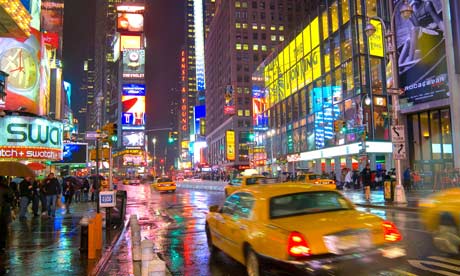
There are many people who think they've dismissed any criticism of capitalism if they find that the person doing the criticism owns some of its products. You, with your mobile/laptop/trainers/coffee (delete as appropriate) are going to tell me that the system doesn't work! Argument over, hypocrisy proven. The problem is, many on the left have disarmed themselves against any possible counterattack. If you genuinely do distrust industrial production, if you do believe that a mass, mechanised civilisation is incompatible in some way with democracy, post-fossil fuel economy or a humane society in general – and such opinions are not rare – then you necessarily have to own up to the critique, something that the guiltily uneasy combination of hay bales and laptops found at many protest camps can make especially uncomfortable.
Marshall Berman, the Bronx-born writer who died last week aged 72, would not have had any problems with replying. His books, especially the sprawling All That is Solid Melts into Air, were attempts to reclaim the concept of modernity for Marxists, and for the left in general – while registering the many sensible reasons it would have for being shy of doing so. The book begins and ends with the area of the south Bronx where Berman was raised, transformed by the early 1980s into a wasteland by the actions of the urban planner Robert Moses, who had hacked through the area with "a meat-ax" (his words), for the purposes of the cross-Bronx expressway. The destruction was vast, and it was hard to imagine that destruction on this scale – not just holes left by the blocks demolished for the expressway, but the blight as arson attacks and dodgy landlords incinerated much of what was left – was not the result of war or total economic collapse. Instead, it was the result of what Moses would have called "progress", of "modernity" itself.
So Berman had plenty of reason to want to bury Moses, and the modern urbanism that he represented. Instead, he did something subtler. Berman describes the "ordeal" this caused to anyone from the area without forgiveness or ambiguity – but he also recalls the New York World's Fair, the Jones and Orchard beaches, innumerable parks, and other spaces that Moses had carved out of industrial wastes, swamps and dumps, places that enlivened his childhood, that spoke of "heroic ideals" like "human adventure, progress, faith in the future". How could the same man, and the same idea have so carelessly and brutally destroyed the Bronx and the lives lived there? There was no "humanistic triumph" here to offset the destruction, just an act of "extravagant cruelty".
Why did this happen? Berman pins the blame on class – these people's lives were worth less than those in the suburbs the expressway was designed to provide commuting space for; on the planner's increasingly lofty position; and the total lack of democratic accountability of the various public-private partnerships he used to execute his plans. Yet he also cites the end of "dialogue between modernism and modernisation", where the introversion and pessimism of postwar modern thinkers, artists and musicians left public space open only to the technocrats. Moses' critics could no longer put forward a different, better version of modernity to his.
The figure that Berman used to describe modernity was Faust, who bargains with his soul in return, in Berman's view, for modernisation and development. He recommends throughout All That Is Solid Melts Into Air that the Faust legend is read dialectically, as a story about the need to have recourse to the "dark side", to the infernal arts of industrialisation and technology. Although he shared their concerns for creating human-scaled places, and for reducing the powers of bureaucracies and big business, environmentalists were sharply criticised, the notion that "small is beautiful" in particular – how can such a philosophy, he asks, hope to achieve the worldwide revolution that its mostly laudable ideas about democracy and transformed production would need in order to be implemented? It's a pertinent question in an age of carbon-trading and offsetting.
In his last book, On the Town, Berman described the awe and excitement he felt in Times Square, as a committed socialist bathing in the pulsating neon light of pure, concentrated capitalist advertisement. He saw in the way people used the space, gathering, wandering, gazing, and the way in which the lights and signs danced around them, as glimpses of a playful future that would always be constrained by capitalism. Socialism, he argues, will mean more – more neon, more cities, more skyscrapers, more people, more production, this time controlled and used consciously, rather than for the enrichment of a small group. It is a vision we would do well to remember.

